Cynthianna's Blog, page 7
October 12, 2015
Style Over Substance in (New) Doctor Who
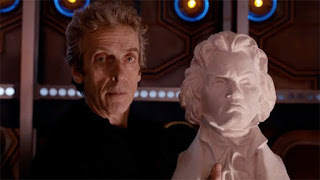
Style Over Substance in (New) Doctor Who
By Cynthianna
***Spoiler Alert! You may want to watch the episode first before reading this review.***
Which came first—the chicken or the egg? In Steven Moffat’s Doctor Who universe the answer is of course “both.”
Before the Flood starts out with a scene in which we see the Doctor by himself in the TARDIS. He breaks the “fourth wall” by talking directly to the viewer as he peers directly into the camera lens. In spite of Peter Capaldi’s engaging performance, this is still considered a very poor writing technique. Dumping information into the viewer’s lap upfront means the writer doesn’t trust that the viewer is intelligent enough to discern it for himself or herself simply by watching the episode.
As in all strong writing, the principle of “shownot tell” should be adhered to. The “wink-wink” of actors talking knowingly into a camera should be avoided, as it indicates to the viewer that the character of the Doctor realizes he’s a fictional construct and the episode is all just so much make-believe. Instantly, all tension and wonder at how the Doctor will survive this week’s dilemma evaporates. Why should we continue watching if we know how it’s all going to end?
But under the current producer’s guidelines it seems that the series protocol is to write down to the lowest common denominator of viewer intelligence. So, the Doctor starts out by telling us all that he believes in time paradoxes (even though this form of time travel has been forbidden in the past). He, essentially, is going to rewrite his own history, and he knows full well that he’s going to do it. Okay, this paradox of time travel was used to great comic effect on Futurama when Fry goes back in time and accidentally sleeps with his own grandmother, impregnates her and becomes his own grandfather. But why does Doctor Who feel it needs to repeat this particular sci-fi cliché?
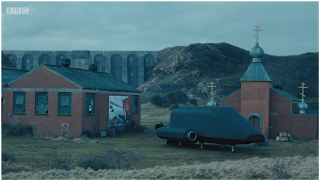
With a thin plot about a time paradox that’s been done many times before (and often to provide comedy), there’s not much else to enjoy in Before the Flood other than the very nice underwater base set and the very interesting Cold War 1980s military training village the Doctor and two others travel back to in order to save Clara. Of course, he has to save Clara at the cost of the others’ lives. Saving other characters isn’t important, as their function is to serve as cannon fodder to create “tension” in an episode that has no inherent tension. (And why do they travel in time to the Soviet-style village in Britain anyway? Couldn’t it have been just a normal Scottish village built near a massive dam? No explanation is given, and it’s a shame, as it looked like a very unique place to set a Ten Little Indians type of tale.)
To sum up, we’re given the entire episode’s plot premise in the first few minutes, and to fill in the remaining 45 minutes we have lots of running around on well-constructed sets and a few explosions and SFX. Well done. A couple of the survivor side characters express love and admiration for each other. Nice enough. The handsome Peter Capaldi smiles some at the camera and shows off his awesome guitar-playing skills. Fan girl “squee!”
All of these things are done well, but you're left with a hollow feeling inside. You feel that nothing really has happened of any consequence for the Doctor, and nothing was ever at risk since we know how it all will end in the first scene. A true triumph of style over substance. If we know the “punch line” from the start, why tell the joke at all?
Which came first—the chicken or the egg? Does it really matter if they’re both cracked?
What do you think? Please leave your comments below. And check out my reviews of earlier episodes of this series of Doctor Who:
Under the Lake The Witch's Familiar The Magician's Apprentice Classic Who on Retro TV
Published on October 12, 2015 17:46
October 7, 2015
The Logic Gaps of (New) Doctor Who
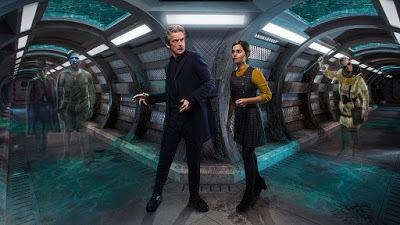 The Logic Gaps of (New) Doctor Who by Cynthianna
The Logic Gaps of (New) Doctor Who by Cynthianna ***Spoiler Alert! You might want to watch the show first.***
I apologize if this is a bit late, but we’re in between two sci-fi cons and life keeps getting in the way. We hope to see you this weekend at Conclave in Dearborn, Michigan.
After seeing this week’s episode, Under the Lake, I am in two minds about it. First off, the special effects and sets are superb. When the Doctor and Clara walk out of the TARDIS and into the underwater base it looked like the real deal and had that “lived-in” look. Very nicely done! Secondly, the viewer has to check his/her brain in at the door when trying to explain the plot to another person because the logic gaps in the story are bigger than a sinkhole after a flood.
Since I live with a British person, I usually go to him for explanation about the setting. He informs me that the town in Scotland isn’t on a lake but lies along the North Sea, so the title seems a bit misleading. Even if it’s one hundred years into the future and climate change has raised the ocean levels, this town in Scotland probably isn’t going under he assures me since Scotland is actually rising up as the southern part of Great Britain tilts down and will receive the worse of the sea inundation. So, are they in “fresh water” or “salt water” in this story? Confusing.
Another confusing story detail—why would they be drilling for oil in Scotland a century from now? Sure, it could be used for plastics and the like, but wouldn’t they still be pumping the petroleum from the North Sea platforms and using the sideways drilling techniques the fracking industry espouses? And why would you go underwater and live in an underwater base to drill in the first place? It’s pretty costly. Once again, geography and geology don’t quite jive. Doctor Who has traveled a long way from its original premise of being a family friendly show that tries to teach science and history to its audience.
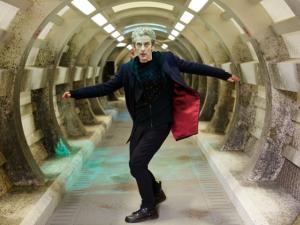
The “ghosts” haunting the underwater base were creepy, but I also found them somewhat confusing. They could lift and carry solid objects of size, but then they couldn’t take them through walls with them. Usually, ghosts can’t touch or manipulate solid matter, so perhaps next week we’ll find out what they really are? Aliens? Here’s hoping! The casting of a deaf actress (one assumes) as leader of the group was a pleasant surprise. It’s nice to know the Doctor can read sign language even if he can’t figure out the alien runes on the inside of the spaceship.
But what really had us scratching our heads was the idea that the “ghosts” were sending out a message to a rescue mission somewhere in the vicinity of the constellation of Orion. Somehow, by killing more and more humans, it makes a stronger “signal” to broadcast to the alien rescuers. Huh? Last time I checked, usually you needed a device such as a radio dish to send out a message across interstellar space. Maybe this bit of confusion will also be solved by next week’s episode?
I found Peter Capaldi channeling Tom Baker throughout Under the Lake intriguing. He’s slightly more lovable this season so far, even when he’s acting arrogant and ill-mannered. Clara’s personality has all the clarity of a cipher, however. No flashbacks to her horrible experiences losing her boyfriend at all? It’s like she’s a completely different young woman. Odd, really. Whenever most people lose a loved one it leaves a lasting mark on the psyche that’s noticeable by their words and actions.
Creepy baddies and a cool set are nice, but a story and characters that aren’t as full of holes as Swiss cheese would be welcome.
Published on October 07, 2015 15:07
October 4, 2015
World Teachers' Day
Published on October 04, 2015 22:00
September 29, 2015
The Lost Canon of (New) Doctor Who
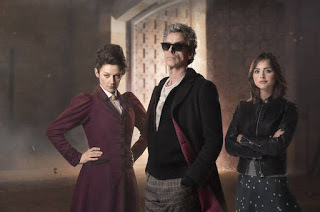 "Sonic specs" beat out the "sonic screwdriver"?The Lost Cannon of (New) Doctor Whoby Cynthianna
"Sonic specs" beat out the "sonic screwdriver"?The Lost Cannon of (New) Doctor Whoby Cynthianna***Spoiler Alert! If you haven't seen this episode, you might want to wait to read this.***
We're almost out the door to attend two sci-fi conventions in a row--Archon and ConClave--where we'll be discussing Doctor Who (as well as writing/editing topics) with our fellow fans. I felt I should post my opinions before we left town, so here is my short (but not overly sweet) review of episode two, The Witch's Familiar.
Overall, it's an okay episode for Moffat's writing, but it's nowhere near the quality of his writing in Blink. (Honestly, I don't expect much better from him anymore.) There's nothing very original in the storyline, and there's a lot of padding once again, and the annoying Mary Poppins-clone called Missy is still about, but there's less of her lewd behavior this week and for that I'm grateful. Instead, we see maniacal Missy act sadistically by dangling Clara upside down in the desert of Scaro and sharpening a stick and threatening to eat the school teacher, but no sexual moves were made toward the Daleks that I could detect. (I had a hard time hearing the dialogue this week.) Nasty threats of violence and silly faces... What else is new? (Ho-hum.)
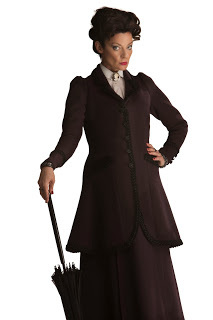 Did Missy really need to be included in this look into the Doctor's relationship with the Daleks and their creator, Davros? Not really. The two-part story probably would have been much stronger without her childish and nasty/lewd antics and about ten minutes in length total. The story's focus should have leaned more to the Doctor's ongoing dilemma in regard to the Daleks--"Do I commit genocide and rid the universe of them or not?"--and away from the puerile gimmicks of Michelle Gomez making her now trademark silly faces.
Did Missy really need to be included in this look into the Doctor's relationship with the Daleks and their creator, Davros? Not really. The two-part story probably would have been much stronger without her childish and nasty/lewd antics and about ten minutes in length total. The story's focus should have leaned more to the Doctor's ongoing dilemma in regard to the Daleks--"Do I commit genocide and rid the universe of them or not?"--and away from the puerile gimmicks of Michelle Gomez making her now trademark silly faces.The strongest aspects of the script were the Doctor's confession that he did have compassion and could show mercy to an enemy. Jenna Coleman's character was given a chance to act this out when Clara finds herself imprisoned in a Dalek's casing and mistaken for being one of the ruthless killers. Quite telling is that when you say "I love you" through a Dalek's voicebox the word "Exterminate" comes out instead. That nice touch aside, Moffat throws out the long history of Dalek canon and informs us now that "Daleks never die" but they do turn into melting fudge or what could pass for the inside of a particularly nasty baby diaper whenever they cease to be active and go down to Scaro's "sewers/graveyards". Ugh... yuck!
For some reason, Moffat can't seem to follow canon with either of the Doctor's most notorious villains, the Cybermen and the Daleks. For fans of the classic series, it can be disconcerting to say the least. The gross bits of oozing "poop-colored" buried Daleks sliming all over the shining metal Dalek casings didn't do much for me personally, and I rather wish the episode had stayed more with the "human" storyline of the Doctor caring for the ailing Davros.
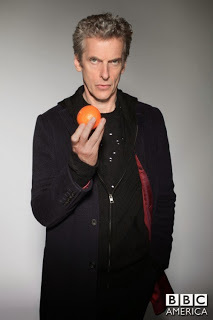
But Peter Capaldi got a chance to shine this week as the Doctor and I sincerely appreciate that. But "sonic Ray Bans"? Really? Not making enough money on the Sonic Screwdriver toys because fans are building their own models? What a not-so-cheap shot at product promotion, BBC!
Published on September 29, 2015 14:41
September 21, 2015
The Crudeness of (New) Doctor Who
The Crudeness of (New) Doctor Whoby Cynthianna
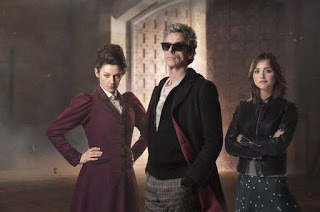 Will the Doctor ever play the recorder again?
Will the Doctor ever play the recorder again?***Spoiler Alert!***
(If you've not seen the first episode yet, you might want to read this later. Just sayin'!)
Last week, I wrote about The Charm of Doctor Who, comparing and contrasting the Doctor’s various personas in the classic series. This week I thought I’d give a short review on the new series' latest episode, The Magician’s Apprentice.
First off, I’m not very clear on the title. The Doctor seemed to have a helper in Bors, but is he really an “apprentice” and is the Doctor a “magician” or just wearing a red lined magician’s jacket? Is Clara to become an “apprentice”? There’s no real hint of that being the case yet, and of course, it’s “to be continued” so we’re forced to watch the next episode to find out. At least we can see that Clara is over her dead boyfriend, Danny, and has moved on with her teaching career while moonlighting for U.N.I.T. on the side. (One wonders whatever happened to Martha Jones and Mickey Smith—aren’t they still working for U.N.I.T.? Perhaps they’d be better agents to contact in these type of situations?)
Second thing, the “charming” element of the show seems to have gone for good, replaced by crudeness and lewd behavior. Of course, I'm referring to the scene where Missy (still wearing the Mary Poppins’ outfit) makes an off-color adult remark about the TARDIS and then strokes the Dalek’s “ball” in his “crotch area”. Uh, yeah… That’s pretty much killed any family-friendly rating for the entire series in my opinion, but it’s perhaps what the current show runner wants. After all, if your target audience is seventh grade boys, then why not litter the show with middle school boys’ locker room humor? Heck, you don’t even need to think about pleasing the female viewers or more mature adults in the audience, do you? (And those pesky seven and eight year olds—who said you could stay up late and watch, Doctor Who, huh? Mom, Grandma—get those little ones in bed!)
The best elements of the episode (disconnected as they are) were the fact that Peter Capaldi plays a mean guitar and the opening five minutes with the young boy Davros standing in a battlefield. The Davros-as-a-young-boy scene harkened back to the Tom Baker era when the Fourth Doctor pondered, “Should you kill a race knowing that one day they could become mass murderers?” The Fourth Doctor didn’t commit genocide that day, and you do wonder if that decision ever plagued him later. But after the first five minutes, the big yellow tank (however did the Doctor transport it there?) and the guitar playing (the Doctor gave up tooting the recorder, huh?) took over, and then came the crude comments of the psychopathic Missy on the Dalek's home world which sullied the whole story concept.
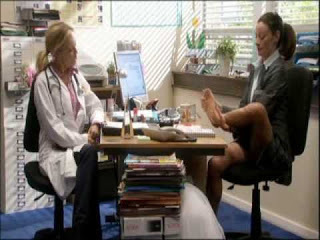 Dear ol' Crazy Sue White...
Dear ol' Crazy Sue White...I mean, was the character of Missy even necessary for this story? (No explanations given on why she’s still alive or how the Doctor knows how to contact her to give her his last will and testament.) Couldn’t more emphasis be put on the Doctor and his “decision” with the boy Davros and how he might make right his decision not to commit genocide against the Daleks previously? The Magician’s Apprentice held the kernel of a great story idea, but instead we get stuck with a foul-mouthed middle aged woman dressed as Mary Poppins burning up the screen. Why are women of a “certain age” (I being one of them) to be portrayed as homicidal lunatics with lewd behaviors and horrible taste in clothing? (I don’t own any Edwardian-era purple traveling suits myself. None of my friends do, either.)
Oh, well, at least Clara was shown to be level-headed and not riddled with angst about lying to her soldier boyfriend this time out. She’s a lot less irritating than last year—so far. But why do we need to be stuck with Michelle Gomez’s repetition of her crazy hospital administrator Sue White from Green Wing? Surely she’s got more acting chops than just playing crazy and crude psychopaths?
 We’re lucky, however. We get Retro TV, and this week Retro TV is broadcasting the classic series Jon Pertwee adventure Inferno. Companion Liz Shaw and the scientist Petra Williams are both written as strong, intelligent and independent females who help the Doctor solve the mystery of why it’s so dangerous to frack our planet. (Okay, they’re drilling into the Earth’s crust and not fracking, but it’s similar!) The Third Doctor even time-warps into an alternate reality and meets up with an evil Sergeant Benton and a scarred-face Brigadier in a pirate’s eye patch. Exciting sci-fi adventure with no crude commentary allowed. As long as we have these older episodes available, the charm of Doctor Who lives on.
We’re lucky, however. We get Retro TV, and this week Retro TV is broadcasting the classic series Jon Pertwee adventure Inferno. Companion Liz Shaw and the scientist Petra Williams are both written as strong, intelligent and independent females who help the Doctor solve the mystery of why it’s so dangerous to frack our planet. (Okay, they’re drilling into the Earth’s crust and not fracking, but it’s similar!) The Third Doctor even time-warps into an alternate reality and meets up with an evil Sergeant Benton and a scarred-face Brigadier in a pirate’s eye patch. Exciting sci-fi adventure with no crude commentary allowed. As long as we have these older episodes available, the charm of Doctor Who lives on. What do you find "charming" about Doctor Who? Do you find it in the classic series or the newer series? Leave your comments in the comment box below. Thanks!
Published on September 21, 2015 14:32
September 12, 2015
The Charm of Doctor Who
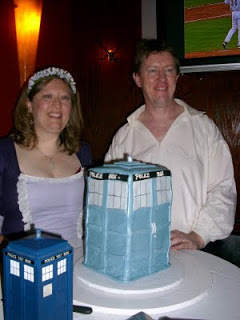 Our wedding cake was the TARDIS, of course!
Our wedding cake was the TARDIS, of course!The Charm of Doctor Who by Cynthianna
Before the new series of Doctor Who starts up again, I wanted to reflect back on the classic series for a moment. The world’s longest running science fiction/fantasy television show began in November 1963, the same day Kennedy was assassinated. These events live on in our imaginations, albeit for very different reasons. The young president’s death demonstrated the harsh realities of the human condition, while the wandering Doctor and his companions emphasized our capacity to overcome adversity through the use of science, with a splash of courage and derring-do added in for fun. Admit it—sometimes we long for a brief respite from the horrors of the world, a chance to catch our breaths and see the “good guys” win. This much desired escapism the classic series of Doctor Who delivered, and it’s why it continues to strike a chord within its fans.
The First Doctor’s charmed us with his outwardly crusty mannerisms that hid his inwardly caring nature. London school teachers Barbara and Ian were the perfect foils to reveal how the Doctor wanted to make a difference without being seen as a superhero rushing in at the last moment to save the day. The First Doctor’s true charm was his sense of humility, his sense that he could advise and help others, but, in the end, they needed to solve their own problems and live life on their own terms. After all, he lived his life on his own terms when he took off in the TARDIS, leaving his home world and people behind. Why would he act disrespectfully by telling others what to do?
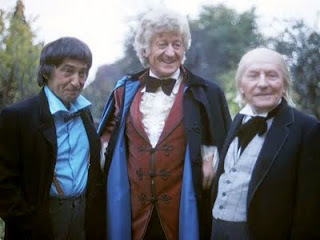 The Three DoctorsThe Second Doctor charmed us with his sense of endless curiosity. The universe—and its dimensions beyond—was this recorder-playing piper’s playground. He and his companions often found themselves involved in convoluted scenarios on planets they weren’t always welcome on. Ever the stranger, he soon became a trusted confidant to those he helped. In the end, his punishment was to be exiled and his closest friends’ memories of their adventures together—all except their first encounter—were taken away. What could be worse for a “cosmic hobo” than to lose his traveling buddies and their shared escapades?
The Three DoctorsThe Second Doctor charmed us with his sense of endless curiosity. The universe—and its dimensions beyond—was this recorder-playing piper’s playground. He and his companions often found themselves involved in convoluted scenarios on planets they weren’t always welcome on. Ever the stranger, he soon became a trusted confidant to those he helped. In the end, his punishment was to be exiled and his closest friends’ memories of their adventures together—all except their first encounter—were taken away. What could be worse for a “cosmic hobo” than to lose his traveling buddies and their shared escapades? The Third Doctor charmed us with his James Bond-like skills of Venusian Aikido and his love of fast cars and boats. Both his crustiness and his caring heart were evident as he scolded the Brigadier and his friends at U.N.I.T. for their tendencies to shoot first and ask questions later. The Third Doctor felt trapped in his exile on Earth, yet didn’t take his frustrations out on his adopted people and planet, doing his best to help humans and aliens to live in peace and harmony. Was it really any surprise to him when they ignored his sage advice?
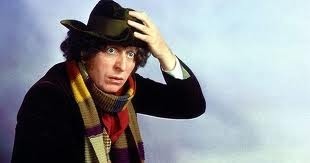 The Fourth DoctorThe Fourth Doctor charmed us with his whimsical foresight. You could say he’d be around the block now in his four regenerations, and human beings and their self-defeatist antics didn’t faze him much, even though he often voiced his disappointment in our apparent lack of wisdom. The Fourth Doctor is sometimes seen as a clown in his long scarf, floppy hat with the ever-present bag of jelly babies (sweets) in his pocket, but his strength came in allowing his adversaries to underestimate him. His deep, caring nature and humility, along with the cosmic hobo’s sense of curiosity, drove him to do better, to help out, to become more involved—sometimes as the cost of his own safety. How would it feel to be seen as being something less than you really are, yet all the while you intuit others have come to depend upon you for so much?
The Fourth DoctorThe Fourth Doctor charmed us with his whimsical foresight. You could say he’d be around the block now in his four regenerations, and human beings and their self-defeatist antics didn’t faze him much, even though he often voiced his disappointment in our apparent lack of wisdom. The Fourth Doctor is sometimes seen as a clown in his long scarf, floppy hat with the ever-present bag of jelly babies (sweets) in his pocket, but his strength came in allowing his adversaries to underestimate him. His deep, caring nature and humility, along with the cosmic hobo’s sense of curiosity, drove him to do better, to help out, to become more involved—sometimes as the cost of his own safety. How would it feel to be seen as being something less than you really are, yet all the while you intuit others have come to depend upon you for so much? The Fifth Doctor charmed us with his athleticism and his uprightness. His crustiness and world-weariness revealed themselves in his reserved manners and tendency to preach to his young group of companions. But there was never any doubt the Fifth Doctor still cared for the human race—the sacrifice of his own life by giving all of the spider’s poison antidote to his last companion demonstrated his humility and caring. Would anyone expect less of the Doctor? Would the Doctor expect any less of himself?
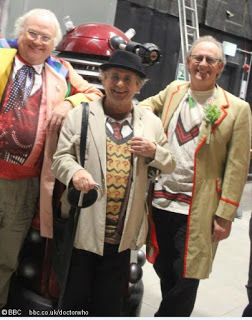 The Fifth, Sixth, and Seventh DoctorsThe Sixth Doctor charmed us with his unexpected energy and driven disposition. Time was catching up with the Time Lord, and sometimes his rudeness showed his impatience with the fact that although he had changed, the occupants of the universe hadn’t. They gladly accepted his assistance, but they didn’t give credence to the good he did and often tried to undermine him. The Sixth Doctor continued to care and to serve in spite of his own people’s cruel betrayal by putting him on trial. Misunderstood and ridiculed, was the Doctor growing tired of helping ingrates who couldn’t see the compassionate individual behind his coat of many colors?
The Fifth, Sixth, and Seventh DoctorsThe Sixth Doctor charmed us with his unexpected energy and driven disposition. Time was catching up with the Time Lord, and sometimes his rudeness showed his impatience with the fact that although he had changed, the occupants of the universe hadn’t. They gladly accepted his assistance, but they didn’t give credence to the good he did and often tried to undermine him. The Sixth Doctor continued to care and to serve in spite of his own people’s cruel betrayal by putting him on trial. Misunderstood and ridiculed, was the Doctor growing tired of helping ingrates who couldn’t see the compassionate individual behind his coat of many colors? The Seventh Doctor charmed us with his need to put things right. A long life as a wanderer throughout time and space had taught the Doctor that he had an obligation to clean up some of the messes left behind by him and others. Evoking his whimsical side with his question mark umbrella, he was seen as a clown, a role he used to great advantage. Underestimated and reviled, he continued to lend a hand wherever and whenever necessary, expecting and receiving neither honors nor acknowledgment. A hero to the end, was it his simple love of humanity that drove him onward in spite of insurmountable obstacles?

The past year we’ve enjoyed watching (and re-watching) the remaining episodes from the classic series of Doctor Who. When you consider the great actors, writers and producers who created the series, is it any wonder its genuine charm hasn’t faded over the years? The new series of Doctor Who hasn’t quite lived up to this great wealth of good-feelings generated by the classic series character of the Doctor, alas. We wait to see if “Nu Who” can yet be redeemed, hoping it's not completely devolved into a teenage-oriented soap opera focused on photogenic young companions that doesn’t quite demonstrate the charm of the humble, caring, heroic original Doctor.
What's your take on classic Doctor Who. Do you think the new series has come close to the charm of the original? Leave your comments in the comment section below. Thank you.
Some of my other essays on Doctor Who include:
Doctor Who: The Last Christmas Special Ever?
Doctor Who vs. Agents of SHIELD: Creating Strong Female Characters
The Death of Doctor Who
I Got the Doctor Who Let Down Blues
Published on September 12, 2015 05:00
September 8, 2015
Global Literacy is Everyone's Concern
Published on September 08, 2015 14:29
August 30, 2015
Book Review: Soul of a Citizen
 Soul of a Citizen: Living With Conviction in a Cynical Time
Soul of a Citizen: Living With Conviction in a Cynical Time by Paul Rogat Loeb
My rating: 5 of 5 stars
Soul of a Citizen is a must-read for every intelligent person on the planet. I found my copy in a charity book pile and picked it up because of the title. Once I started reading, I couldn't put it down. It is more relevant and quotable today than it was when it was published in 1999. No kidding--you'll believe Loeb wrote this masterpiece just yesterday so prescient is his vision. It's that timely. Every home should have this book on their shelf for quick and easy reference.
Loeb inspires and motivates us to get off our backsides in Soul of a Citizen and get out into the world and fight for what we believe in. He deftly illustrates his points with examples of everyday people taking action who never believed they could do such a thing. These aren't "professional activists" or superheroes. These are folks who never thought they could make a difference in their community, their state, or the world at large, but who, nevertheless, found the courage to stand up and speak out for what they believed in and ended up making a difference for the better. Sure, times can be rough and not every effort will be met with immediate success, but when we sit back and do nothing we effectively kill off a piece of our soul Loeb warns. And the world is diminished that much more.
So, ignore the "insouciant smirks" or the "snark" (my term) that our society dishes out via the media whenever it tries to convince us that anything one person (or a group united for a good cause) attempts can't possibly make the world better. This snark, smirk or institutionalized cynicism has been perpetuated by the billionaires and millionaires for the past 40 years to keep us in our place. We all have been living under its soul-destroying cloud for so long that we've internalized it and come to believe its falsehoods. Worse yet, these oligarchs enjoy our "learned helplessness"--or should it be called "learned hopelessness"? The masses are lost in the consumer-driven culture and given up, filling their lives with empty bread (Starbucks?) and circuses (smartphones). Ordinary people discouraged and despairing won't take action to fight the wrongs made by greedy corporations and bought-and paid-for-politicians. No, we'll just sit and stare at our computing devices and throw in the towel and not fight back. The billionaires will just stuff more money in their offshore bank accounts as they send our jobs to China and accept their corporate welfare checks from the government...
Sound familiar? Want it to stop? Want to make the world a better place for all of God's creation and not just the 1%? Then get off your backside and find Soul of a Citizen in your local library, bookstore or online. Get it and read it. Today. Because tomorrow is the beginning of a whole new world that we can all be proud of because we worked together to make it happen.
#FeeltheBern
View all my reviews
Published on August 30, 2015 18:01
August 6, 2015
Now available in print: Clan Drakul--The Kindred Vampires
For all erotic-romance vampire lovers--and readers who like two stories for the price of one...

Now available from Amazon, my first print book from eXtasy Books--Clan Drakul: The Kindred Vampires by Celine Chatillon.
Click here to order your copy today!
Two tall, dark and handsome vampires looking for someone to share eternity with-while dealing with a maniacal vampire hunter provides the focus for Clan Drakul.
In The Vampire Next Door, Val Drakul thinks the sexy girl upstairs could fulfill his every fantasy, but will Melynda's career plans take a backseat to things that go bump in the night? When a deadly foe ensnares Mel in his plot to rid the world of the Kindred Vampire race, can Val save the mortal woman he loves without transforming her into the lonely being he's become?
Kinsman Vlad Drakul has found the love of his existence in the beautiful businesswoman Sofia, but is the sex-loving vixen all she appears to be? Leo Van Helsing cherishes his family's calling a bit too much. He'll see the bloodsuckers dead, and he's not above using others to obtain his goals-even if it kills them. One fatal night in Istanbul will change Vlad's afterlife forever. Can Vlad abide a Blood Betrayal?
Clan Drakul now available in print at Amazon.


Now available from Amazon, my first print book from eXtasy Books--Clan Drakul: The Kindred Vampires by Celine Chatillon.
Click here to order your copy today!
Two tall, dark and handsome vampires looking for someone to share eternity with-while dealing with a maniacal vampire hunter provides the focus for Clan Drakul.
In The Vampire Next Door, Val Drakul thinks the sexy girl upstairs could fulfill his every fantasy, but will Melynda's career plans take a backseat to things that go bump in the night? When a deadly foe ensnares Mel in his plot to rid the world of the Kindred Vampire race, can Val save the mortal woman he loves without transforming her into the lonely being he's become?
Kinsman Vlad Drakul has found the love of his existence in the beautiful businesswoman Sofia, but is the sex-loving vixen all she appears to be? Leo Van Helsing cherishes his family's calling a bit too much. He'll see the bloodsuckers dead, and he's not above using others to obtain his goals-even if it kills them. One fatal night in Istanbul will change Vlad's afterlife forever. Can Vlad abide a Blood Betrayal?
Clan Drakul now available in print at Amazon.

Published on August 06, 2015 18:25
July 21, 2015
Book Review: Trials of Passion
 Trials of Passion: Crimes Committed in the Name of Love and Madness by Lisa Appignanesi
Trials of Passion: Crimes Committed in the Name of Love and Madness by Lisa AppignanesiMy rating: 4 of 5 stars
Victorian-era spinster Christiana Edmonds was extremely unhappy that her letters weren’t returned by her doctor, Charles Beard. Of course he loved her and would leave his wife, but Beard never did. He simply told Christiana to stop writing. Things stalemated until a rash of poisonings—which resulted in the death of a four-year-old boy—exposed Christiana’s plans to hide her attempted murder of Mrs. Beard by broadcasting handmade poisoned chocolate creams throughout the community. Alas, her handwriting on repeated requests for strychnine and cyanide from the local chemist’s gave her away. She pleaded not guilty and stated Dr. Beard had besmirched her honor, but the “Borgia of Brighton” was sentenced to life in an asylum—not to death by hanging. Her lawyer and the “alienists”—what we’d call today psychologists—had argued that Christiana’s unrequited love had induced a madness that had driven her to this desperate act.
Trials of Passion takes a tantalizing look into landmark cases in the U.K., France and the U.S. during the later-half of the 19th and into the early years of the 20th century that set the standards we recognize today for the legal defense of temporary insanity. Appignanesi shows how these crimes and their trials demonstrate changing gender roles in Western society. The belle époque’s attitude was that women (and some men) were “hysterics” or mentally feeble and suggestible to commit these crimes, but in actuality, these criminals were simply crying out for justice that their culture didn’t address. The poor and downtrodden committed crimes of passion to right wrongs perpetrated on them by the powerful and wealthy who had left them without honor. However, even millionaires such as American Harry Thaw used this psychological defense to justify his shooting of architect Stanford White because White had raped the beautiful model Evelyn Nesbit, who later became Thaw’s wife, when she was but a teenager. Murder had become a “cure for insanity”.
Trials of Passion is a fascinating read for those interested in history, psychology, and the legal profession and how these disciplines came together to create the feminist movement and modern ethics.
View all my reviews
Published on July 21, 2015 17:47





